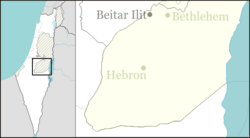Otniel
| Otniel עָתְנִיאֵל | |
|---|---|
|
| |
 Otniel | |
| Coordinates: 31°26′23″N 35°01′44″E / 31.43972°N 35.02889°ECoordinates: 31°26′23″N 35°01′44″E / 31.43972°N 35.02889°E | |
| District | Judea and Samaria Area |
| Council | Har Hebron |
| Region | West Bank |
| Affiliation | Amana |
| Founded | 1983 |
| Population (2015)[1] | 909 |
Otniel (Hebrew: עָתְנִיאֵל) is a Jewish Orthodox Israeli settlement in the West Bank. Located in the southern Judaean Mountains, south of Hebron, it falls under the jurisdiction of Har Hebron Regional Council. In 2015 it had a population of 909.
Israeli settlements in the West Bank are considered illegal under international law, but the Israeli government disputes this.[2]
Etymology
Otniel is named after Judge Otniel Ben Knaz.[3]
History

The settlement was established in 1983 south of Beit Hagai and north of Shim'a and the Palestinian village of as-Samu, Yatta, Hebron and ad-Dhahiriya. It is the location of the Yeshivat Otniel, a hesder yeshiva.
Facilities
According to Or report[4] and the settlement website,[5] the settlement has :
- pool
- infirmary and a A family health center (Tipat Halev), in case of prolong treatment residents will receive treatment in Be'er Sheva[6]
- Yad Sarah branch
- Gan Trom Hova (nursery school up to age 3) Gan Hove (compulsory nursery school from age 3)
- Regional school, elementary school and a Middle school
- Tzarchania (small shop)
- Synagogue
- Library
- Women and Man Mikveh
Status under international law
The international community considers Israeli settlements to violate the Fourth Geneva Convention's prohibition on the transfer of an occupying power's civilian population into occupied territory.[7] Israel disputes that the Fourth Geneva Convention applies to the Palestinian territories as they had not been legally held by a sovereign prior to Israel taking control of them. This view has been rejected by the International Court of Justice and the International Committee of the Red Cross.[8]
Arab-Israeli conflict
In December 2002, four students were killed and ten were wounded by Palestinian gunmen in a terrorist attack on the yeshiva. [9] [10] [11]
In November 2011, an Otniel resident, Rabbi Dan Martzbach, was killed, and two women were wounded, when an Israel Defense Forces patrol, on alert for suspected terrorists, fired on their car as they drove to the Cave of the Patriarchs to pray in the early hours of the morning. [12]
In January 2016, a Palestinian entered the home of a woman and stabbed her to death in front of her three children. [13]
In July 2016, Michael Marc, a resident of Otniel, was killed and members of his family wounded in a drive-by shooting at Adorayim junction near Otniel and Hevron.[14] The shooter, Muhammad Faqih (aged 29) from Dura, was eventually taken down by the IDF and Shin Bet security forces in the early morning hours of 27 July 2016.[15]
Notable residents
- Yehuda Glick (b. 1965), American-born Israeli rabbi and activist
- Yakov Nagen (b. 1967), American-born Israeli rabbi and activist
References
- ↑ "List of localities, in Alphabetical order" (PDF). Israel Central Bureau of Statistics. Retrieved 16 October 2016.
- ↑ "The Geneva Convention". BBC News. 10 December 2009. Retrieved 27 November 2010.
- ↑ Otniel, a religious settlement in the central Har Hebron region
- ↑ http://www.negev-net.org.il/HTMLs/article.aspx?C2004=12712
- ↑ http://otniel.org.il/
- ↑ http://otniel.org.il/index.php/latoshav/2013-09-09-17-46-55
- ↑ The settlers' struggle BBC News. 19 December 2003
- ↑ Legal Consequences of the Construction of a Wall in the Occupied Palestinian Territory International Court of Justice, 9 July 2004. pp. 44-45
- ↑ Haaretz - "IDF kills hebron area jihad leader
- ↑ Israeli Ministry of Foreign Affairs
- ↑ JPost - "Four slain, 10 wounded in attack on Otniel yeshiva"
- ↑ Soldier who mistakenly killed rabbi: I'm sorry
- ↑ http://www.jpost.com/Arab-Israeli-Conflict/One-in-critical-condition-after-suspected-terror-stabbing-in-West-Bank-441793
- ↑ Father murdered in front of his children in Har Hevron shooting
- ↑ Yehoshua, Yossi (28 July 2016). "The Account was Settled" (in Hebrew). Yedioth Ahronoth. pp. 2–3.